Appellate practice is a specialized area of law that focuses on reviewing lower court decisions. In appellate work, parties challenge or defend judgments through written briefs and oral arguments in higher courts. This process allows parties to seek justice by addressing potential errors or misapplications of law in previous rulings.
As you navigate the complexities of appellate practice, you’ll encounter unique challenges and opportunities. The appellate phase of legal work differs significantly from trial court proceedings. It requires a distinct set of skills and strategies.
You’ll need to master the art of crafting compelling legal arguments, analyzing complex legal issues, and presenting your case effectively to appellate judges.
Understanding the intricacies of appellate procedure is crucial for success in this field. Each jurisdiction may have its own rules and standards for appeals, so staying informed about local practices and recent developments is essential. By honing your appellate skills, you can become a valuable advocate for your clients in higher courts.
Key Takeaways
- Appellate practice involves reviewing lower court decisions through written briefs and oral arguments.
- Success in appeals requires mastering legal analysis, persuasive writing, and effective oral advocacy.
- Understanding jurisdiction-specific appellate procedures is crucial for navigating the appeals process.
Understanding Appellate Practice
Appellate practice involves navigating the complex process of appealing legal decisions. It requires specialized knowledge and skills to effectively challenge or defend lower court rulings.
The Purpose and Scope of Appeals
Appeals serve as a crucial mechanism for reviewing and potentially correcting errors in lower court decisions. You, as an appellant or appellee, can present arguments to appellate courts to reconsider legal issues or factual findings.
The scope of appeals typically focuses on specific legal errors rather than retrying the entire case. You must identify and articulate these errors clearly in your briefs and oral arguments.
Appellate lawyers play a vital role in this process. They analyze trial records, craft persuasive written arguments, and present oral arguments before appellate judges. Their expertise in legal research and writing is essential for success.
You should be aware that appellate courts have limited jurisdiction. They generally only review issues that were properly preserved during the original trial. This underscores the importance of raising objections and making a clear record at the trial level.
The Appellate Court System
The appellate court system forms a crucial part of the judicial hierarchy, providing a mechanism for reviewing lower court decisions. It ensures legal consistency and offers opportunities for correcting errors in the application of law.
Structure of the Federal Courts
The federal appellate system consists of 13 Circuit Courts of Appeals. These courts review decisions from federal district courts and certain federal agencies. Each circuit covers specific geographic areas, with the Ninth Circuit being the largest and the Fifth Circuit handling cases from Texas, Louisiana, and Mississippi.
Federal appellate judges are appointed by the President and confirmed by the Senate. They serve life terms, ensuring judicial independence. When hearing cases, judges typically sit in panels of three.
You’ll find that federal appellate courts focus primarily on questions of law rather than fact. They examine whether the lower court applied the law correctly and if proper procedures were followed.
State Appellate Courts
State appellate courts vary in structure across the United States. Most states have an intermediate appellate court and a court of last resort, often called the state supreme court.
State appellate courts review decisions from lower state courts. They handle a wide range of cases, including criminal appeals, civil disputes, and family law matters.
Unlike federal judges, many state appellate judges are elected or appointed for fixed terms. This system aims to balance judicial independence with public accountability.
You’ll notice that state appellate courts often have more flexibility in their procedures compared to federal courts. Some states allow for oral arguments in most cases, while others decide many appeals based solely on written briefs.
The U.S. Supreme Court
The U.S. Supreme Court stands at the apex of the American judicial system. It consists of nine justices who are appointed for life by the President and confirmed by the Senate.
As the highest court in the land, it has the final say on constitutional interpretation and federal law. The Court primarily reviews cases through its certiorari jurisdiction, choosing which cases to hear based on their national importance.
You’ll find that the Supreme Court’s decisions have far-reaching impacts. They can overturn laws, establish new constitutional rights, and shape national policy. The Court typically hears oral arguments from October to April and issues most of its decisions by late June.
The Appeal Process
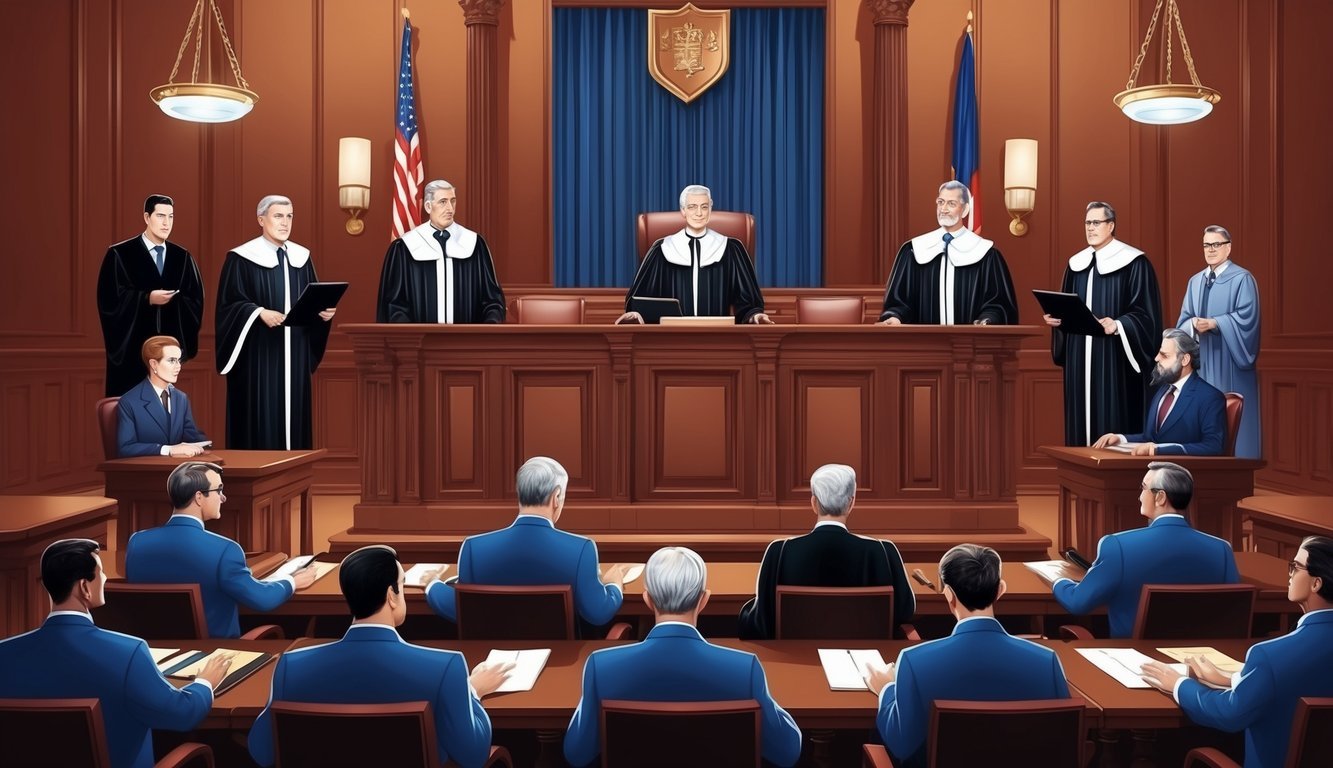
The appeal process involves several key stages that allow parties to challenge lower court decisions. Understanding these steps is crucial for navigating the appellate system effectively.
Initiating an Appeal
To begin an appeal, you must file a notice of appeal with the trial court within the specified timeframe. This document informs the court and opposing parties of your intent to appeal. The rules of appellate procedure govern this process, outlining deadlines and required contents.
You’ll need to order transcripts and compile the record on appeal. This includes relevant documents from the trial court proceedings. Ensure you follow the court’s guidelines for formatting and submission.
Pay close attention to jurisdictional requirements. Failure to meet these can result in dismissal of your appeal before it’s even considered on its merits.
Briefs and Oral Arguments
Appellate briefs are the heart of your appeal. These written documents present your legal arguments to the court. You’ll typically submit an opening brief, followed by the opposing party’s response, and then your reply.
Craft your briefs carefully, adhering to federal rules of appellate procedure or state equivalents. Focus on clear, concise writing that highlights key legal issues and relevant precedents.
Oral arguments offer a chance to address the appellate judges directly. Prepare thoroughly, anticipating questions and practicing your responses. Be ready to engage in a dialogue with the bench, clarifying your position and addressing any concerns.
Decisions and Post-Decision Motions
After considering briefs and arguments, the appellate court will issue its decision. This may affirm, reverse, or modify the lower court’s ruling. The court will provide a written opinion explaining its reasoning.
If you’re unsatisfied with the outcome, you have options. You can file a petition for rehearing, asking the court to reconsider its decision. For cases of exceptional importance, you might submit petitions for review to a higher court.
Be aware of strict deadlines for these post-decision motions. Act promptly to preserve your rights and explore all available avenues for further review.
Roles in Appellate Practice
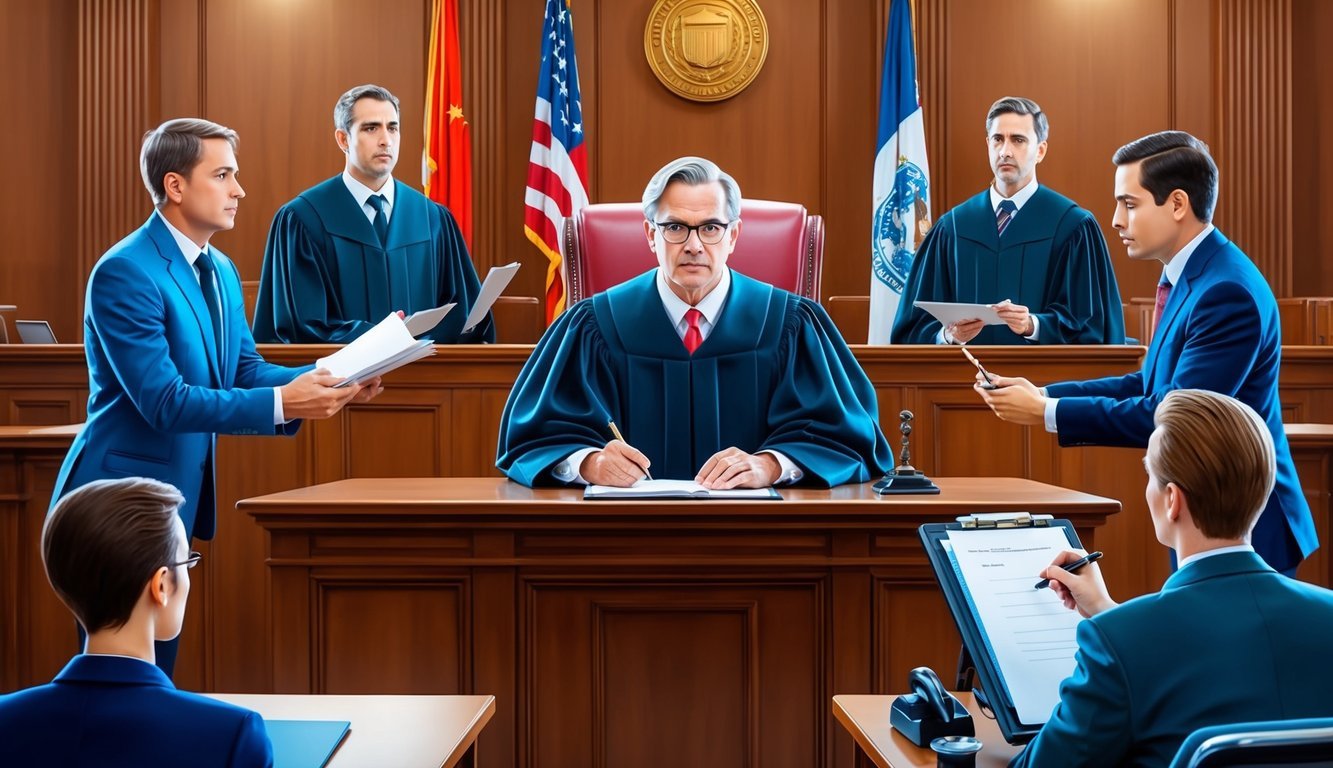
Appellate practice involves distinct roles that contribute to the judicial process. Each participant plays a crucial part in shaping legal outcomes and precedents.
Appellate Lawyers
Appellate lawyers are the primary advocates in appellate courts. You’ll find these specialists crafting compelling arguments and briefs to persuade judges. Their expertise lies in identifying legal errors and presenting complex issues clearly.
Appellate practice demands a unique skill set. You need to master legal research, writing, and oral advocacy. These lawyers often collaborate with trial attorneys to develop effective strategies.
The American Academy of Appellate Lawyers recognizes excellence in this field. Membership is a mark of distinction for those who have significantly advanced appellate practice.
Amicus Curiae
Amicus curiae, or “friends of the court,” provide valuable perspectives in appellate cases. You may encounter their briefs offering additional information or arguments.
These parties, though not directly involved in the case, can influence the court’s decision. Their input often addresses broader implications of the ruling.
Amicus briefs require careful preparation. You must present relevant facts and legal arguments that supplement the main parties’ positions. Organizations, experts, or interested individuals commonly submit these briefs.
Clerks and Staff
Appellate court clerks and staff play vital behind-the-scenes roles. You’ll find them managing case files, scheduling hearings, and assisting judges.
Law clerks, often recent law school graduates, help judges research legal issues. They may draft bench memoranda summarizing cases and suggesting outcomes.
Staff attorneys handle motions, screen cases, and prepare reports for judges.
Legal Standards
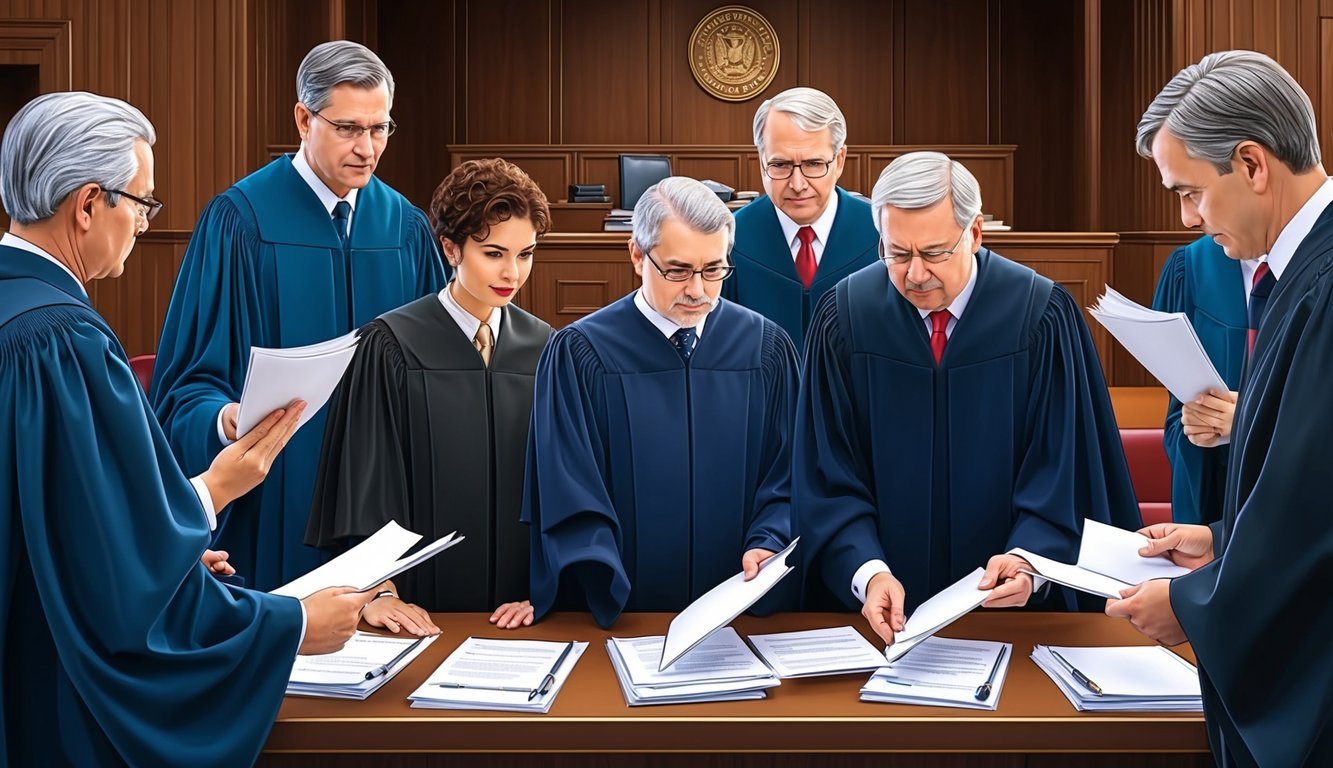
Appellate practice involves crucial legal principles that guide decision-making and interpretation. These standards ensure consistency and fairness in the judicial process.
Standards of Review
Standards of review determine how appellate courts examine lower court decisions. You’ll encounter different levels of scrutiny depending on the issue at hand.
For questions of law, courts apply de novo review, examining the matter anew without deference to the lower court’s ruling.
For factual findings, the clearly erroneous standard often applies. This means you must demonstrate that the lower court’s determination was manifestly wrong to secure a reversal.
In cases involving discretionary decisions, such as evidentiary rulings, the abuse of discretion standard comes into play. You’ll need to show that the lower court’s action was arbitrary or unreasonable to succeed on appeal.
Stare Decisis Principle
Stare decisis, meaning “to stand by things decided,” forms the bedrock of common law systems. This doctrine binds courts to follow precedents set by higher courts or their own previous decisions.
You’ll find that stare decisis promotes:
- Consistency in legal rulings
- Predictability for litigants
- Efficiency in judicial decision-making
However, courts may depart from precedent when societal changes or new legal developments warrant reconsideration. As an appellate practitioner, you must carefully analyze relevant precedents and argue for their application or distinguish them when appropriate.
Interpreting the Law
When you engage in appellate practice, you’ll often grapple with statutory and constitutional interpretation. Courts employ various tools to discern legislative intent and apply laws to specific cases.
Textualism focuses on the plain meaning of statutory language, while purposivism considers the law’s broader objectives. You may encounter canons of construction, such as expressio unius (the expression of one thing excludes others) or ejusdem generis (general terms are limited by specific ones that precede them).
In constitutional matters, you’ll need to navigate originalism versus living constitutionalism debates. Your arguments should reflect a deep understanding of these interpretive approaches to effectively advocate for your client’s position.
Strategies in Appellate Litigation
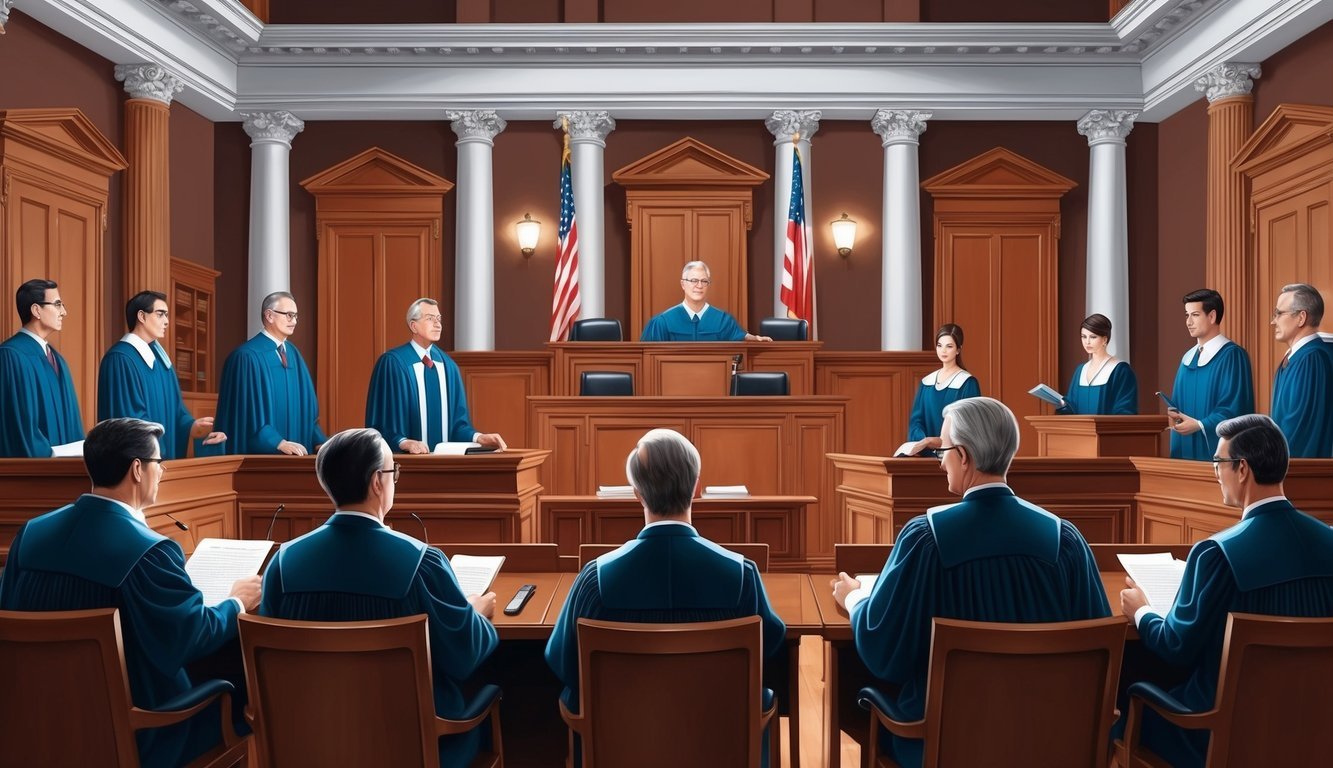
Effective appellate litigation requires a well-crafted approach. You must develop a comprehensive strategy, construct persuasive arguments, and leverage relevant precedents to maximize your chances of success.
Developing a Litigation Strategy
Your appellate strategy begins with a thorough case analysis. Review the trial record meticulously to identify key issues and potential errors. Then, prioritize the strongest arguments that align with appellate court standards.
Consider the composition of the appellate panel and tailor your approach accordingly. Research each judge’s background and previous rulings to anticipate their perspectives.
Evaluate the potential for amicus briefs to support your position. These can provide valuable context and expertise to strengthen your case.
Timing is crucial. Plan your strategy with filing deadlines in mind, allowing ample time for brief preparation and oral argument practice.
Crafting Legal Arguments
Your legal arguments form the foundation of your appeal. Begin with a clear, concise statement of the issues. Frame them in a way that aligns with your desired outcome.
Use persuasive writing techniques to present your case effectively. Start with your strongest points to capture the court’s attention. Then, employ clear, concise language to convey complex ideas.
Anticipate counterarguments and address them proactively. This demonstrates thoroughness and strengthens your position.
Support your arguments with relevant statutes, regulations, and case law. Ensure each citation directly relates to your points and advances your narrative.
Use of Precedents
Precedents play a crucial role in appellate litigation. Identify cases that support your position and explain their relevance to your current appeal.
Distinguish unfavorable precedents by highlighting key differences. If seeking to overturn precedent, provide compelling reasons for the court to reconsider established law.
Analyze recent trends in appellate decisions within your jurisdiction. This can help you anticipate how the court might approach your case.
When citing precedents, focus on cases from your jurisdiction or higher courts. These carry more weight and are more likely to influence the court’s decision.
Special Considerations

Appellate practice involves unique challenges in certain types of cases. These require careful attention to specific procedural and substantive issues that can significantly impact the outcome of an appeal.
Class Actions Appeals
When appealing class action rulings, you must navigate complex procedural hurdles. Certification orders often become critical points of contention. You’ll need to address issues like adequacy of representation and commonality of claims.
Class size and damages calculations can present unique appellate challenges. Courts scrutinize these factors closely on appeal.
You should pay special attention to settlement approvals. Appellate courts may scrutinize the fairness of settlements, especially regarding attorney fees and class member compensation.
Interlocutory appeals are more common in class actions. You must be prepared to argue for or against immediate review of certain rulings.
Trademark Infringement Cases
In trademark appeals, you’ll often grapple with likelihood of confusion analyses. Appellate courts may review these determinations de novo or for clear error, depending on the circuit.
You should focus on how the lower court applied the relevant multi-factor test. Did they give appropriate weight to each factor?
Survey evidence can be crucial in trademark cases. Be prepared to argue its admissibility and probative value on appeal.
Remedies in trademark cases, such as injunctions or damages, are often key appellate issues. You’ll need to address whether the relief granted was appropriate and supported by the evidence.
Insurance Disputes
Insurance appeals often hinge on contract interpretation. You must carefully analyze policy language and relevant case law.
Coverage disputes frequently involve questions of duty to defend or indemnify. Be prepared to argue how these duties apply to the specific facts of your case.
Bad faith claims can add complexity to insurance appeals. You’ll need to address the standards for bad faith and whether the evidence supports such findings.
Choice of law issues often arise in insurance appeals, especially for policies covering multiple jurisdictions. Be ready to argue which state’s law should apply and why.
Advocacy and Persuasion in Appeals
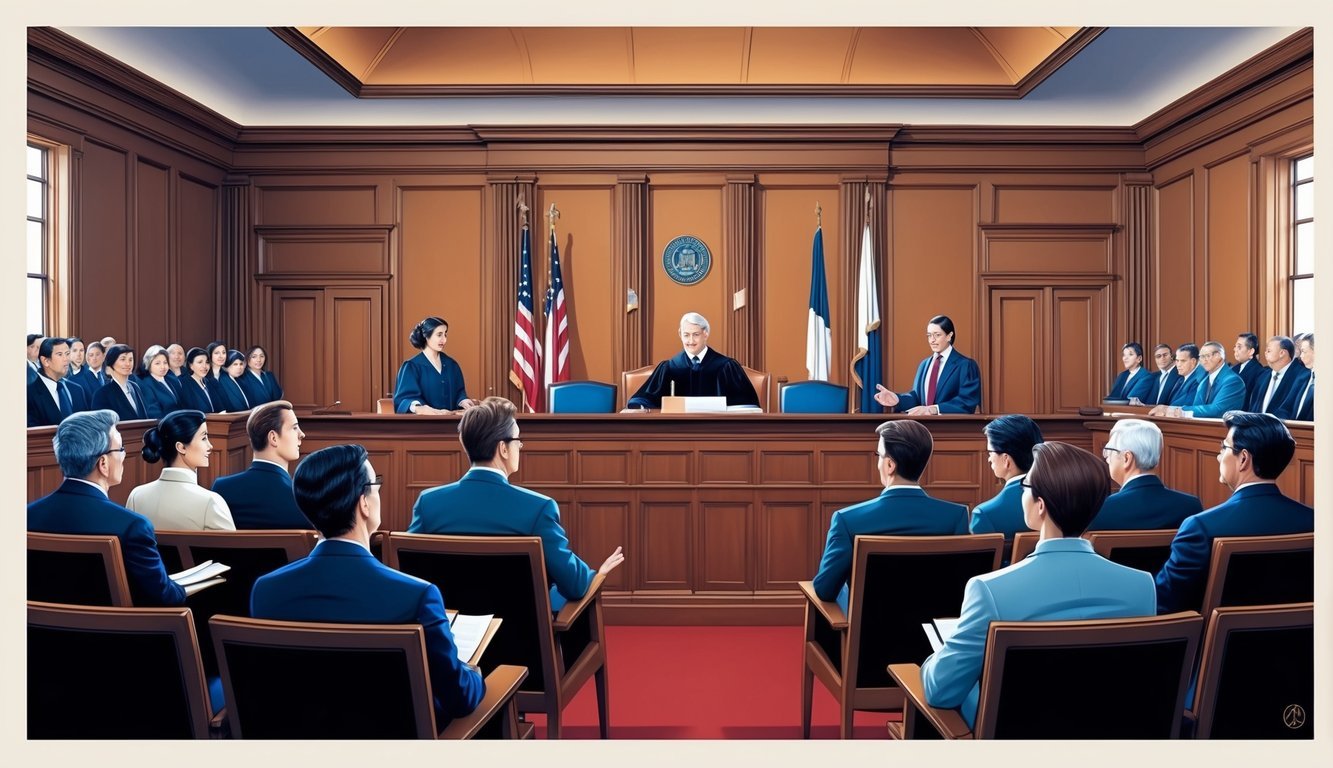
Successful appellate practice hinges on your ability to craft compelling arguments and present them effectively. Your skills in legal writing and oral advocacy are crucial for persuading judges and winning appeals.
Effective Legal Writing
Persuasive written advocacy is essential in appellate practice. Your briefs should be clear, concise, and well-organized. Begin with a strong introduction that captures the court’s attention and presents your key arguments.
Use headings and subheadings to guide readers through your brief. Employ topic sentences to introduce each paragraph’s main point. Then, support your arguments with relevant case law and statutes.
Proofread meticulously to eliminate errors. A polished brief enhances your credibility and shows respect for the court. Remember, judges may form initial impressions based on the quality of your writing.
Oral Advocacy Skills
Effective oral advocacy requires thorough preparation and confident delivery. Know your case inside and out, anticipating potential questions from the bench.
Begin your argument with a strong opening statement that summarizes your position. Then, maintain eye contact with the judges and speak clearly and confidently. Be prepared to adapt your presentation based on the court’s questions and reactions.
Practice active listening during oral arguments. Address the judges’ concerns directly and concisely. If you don’t know the answer to a question, admit it honestly and offer to provide the information later if permitted.
The Role of Appellate Judges
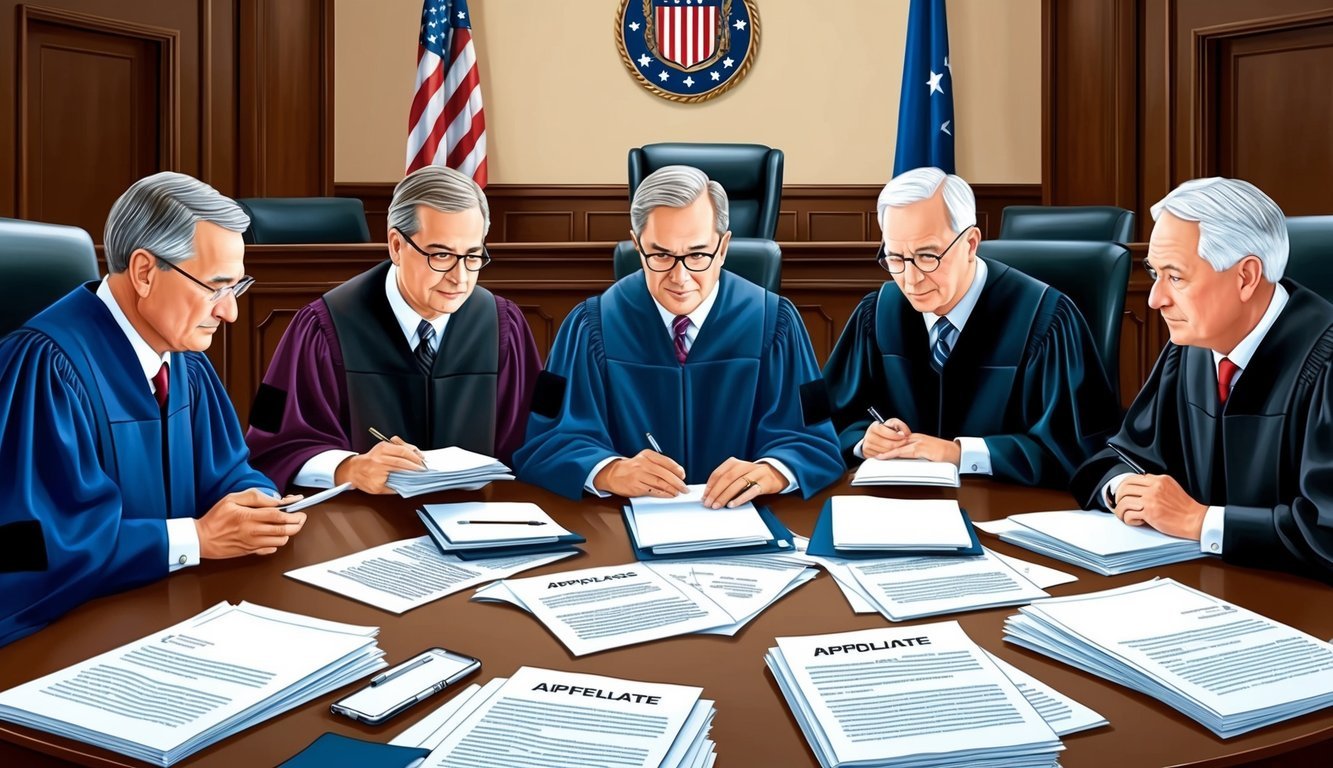
Appellate judges play a crucial role in shaping legal precedent and ensuring justice is served. You’ll find that these jurists carefully weigh arguments, interpret laws, and make decisions that can have far-reaching impacts on society.
Decision-Making Process
When you consider the appellate judge’s decision-making process, you’ll notice it involves thorough analysis and deliberation. You’ll find that judges review case records, legal briefs, and relevant precedents. They often engage in discussions with their colleagues to explore different perspectives.
During oral arguments, you’ll observe judges posing probing questions to attorneys, seeking clarification on key points. This interaction helps refine their understanding of the issues at hand. You’ll appreciate how judges must balance legal principles, societal implications, and the specific facts of each case.
Opinions and Dissents
When you examine appellate court opinions, you’ll discover they serve as the voice of the court. These documents articulate the reasoning behind decisions and provide guidance for lower courts and future cases.
You’ll find that majority opinions set precedents, while concurring opinions offer additional perspectives. Dissenting opinions, though not binding, can influence future legal thinking and sometimes become the basis for changes in the law.
In crafting opinions, judges strive for clarity and precision. You’ll notice they carefully weigh their words, knowing their decisions may be scrutinized by legal scholars, practitioners, and the public for years to come.
Key Appellate Resources
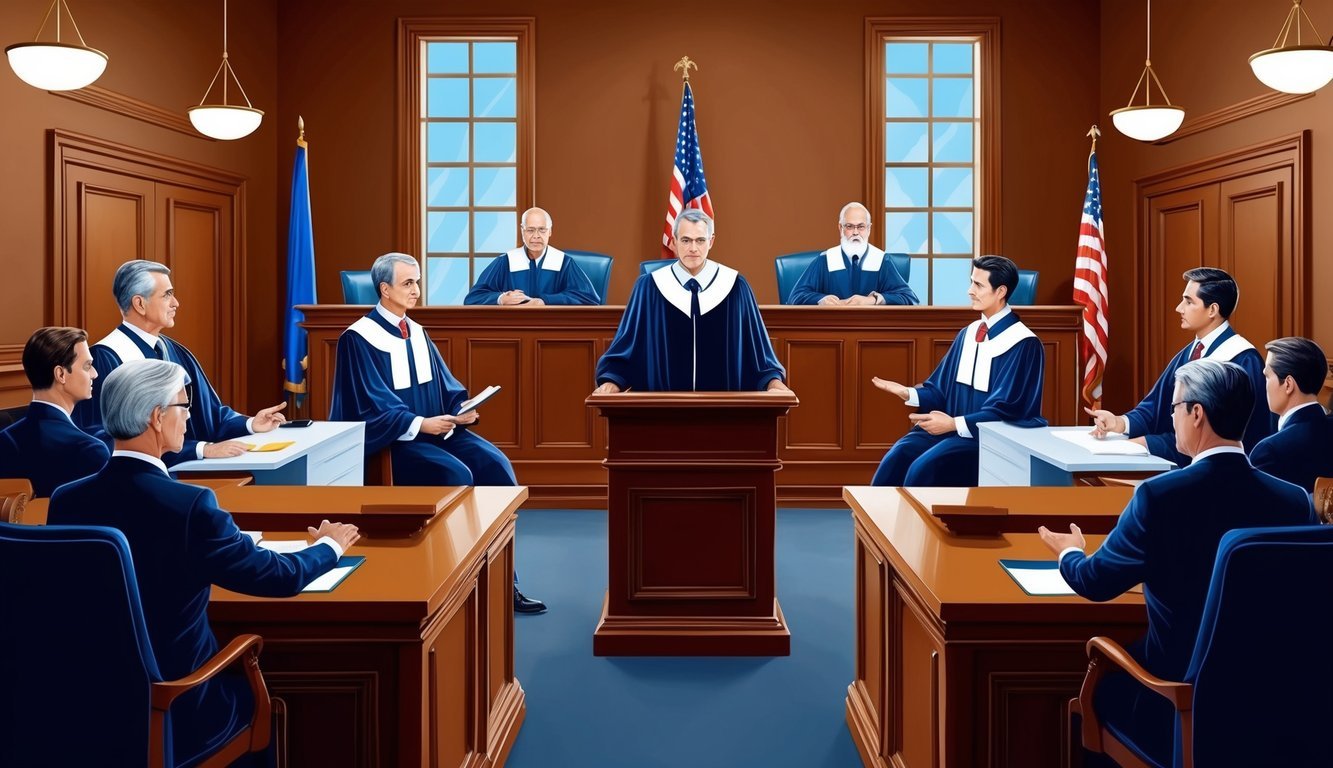
Legal professionals engaged in appellate practice have access to several valuable resources that enhance their knowledge and skills. These include specialized law journals, professional organizations, and collaborative working groups.
Appellate Law Journals
Appellate law journals provide in-depth analysis of appellate court decisions and legal trends. You can find articles on emerging issues, procedural developments, and innovative arguments in these publications. The Journal of Appellate Practice and Process offers practical insights for appellate practitioners.
Many law schools publish journals focused on appellate advocacy. These student-edited publications often feature articles by judges, practitioners, and scholars. You can access them through legal databases or law library subscriptions.
Professional Appellate Organizations
The American Academy of Appellate Lawyers (AAAL) is a prestigious organization for experienced appellate attorneys. You must meet rigorous admission standards to join. AAAL offers networking opportunities, educational programs, and resources for appellate practitioners.
Other organizations, such as the Council of Appellate Lawyers, provide forums for collaboration and professional development. You can attend conferences, participate in webinars, and access member-only resources through these groups.
Working Groups and Committees
Bar associations often have appellate practice sections or committees. You can join these working groups to contribute to the development of appellate practice standards and rules. These groups frequently organize continuing legal education programs and publish practice guides.
Court-sponsored committees also play a crucial role in shaping appellate procedures. You may have the opportunity to serve on rules committees or advisory groups, influencing the future of appellate practice in your jurisdiction.
Frequently Asked Questions

Appellate practice involves unique skills, qualifications, and considerations. Understanding the key aspects of this specialized legal field can help you navigate the appeals process more effectively.
What qualifications are required to become an appellate lawyer?
To become an appellate lawyer, you need a law degree and state bar admission. Strong research, writing, and oral advocacy skills are essential. Many appellate attorneys have clerkship experience with appellate judges.
Experience in trial law can be beneficial, but it’s not always necessary. Specialization in specific areas of law can make you more attractive to clients seeking appellate representation.
How is appellate advocacy distinct from trial advocacy?
Appellate advocacy focuses on legal arguments rather than fact-finding. You’ll primarily work with the existing trial record. Oral arguments before appellate judges are more structured and limited in scope compared to trial proceedings.
Writing skills are paramount in appellate practice. You’ll craft persuasive briefs that analyze legal issues in depth.
What factors determine the cost of hiring an appellate lawyer?
The complexity of your case significantly affects the cost. Appeals involving novel legal issues or extensive records typically require more time and expertise.
The attorney’s experience and reputation can influence fees. Geographic location and the specific court of appeals may also impact costs.
What are the roles and responsibilities of an appellate court?
Appellate courts review lower court decisions for legal errors. They interpret and apply the law, ensuring consistency across jurisdictions. These courts may also establish new legal precedents through their rulings.
Appellate judges often work in panels to decide cases. They may issue majority opinions, concurrences, or dissents.
What constitutes effective appellate practice?
Effective appellate practice requires thorough legal research and analysis. You must identify key issues and present compelling arguments supported by relevant case law and statutes.
Clear, concise writing is crucial. Your briefs should be well-organized and persuasive. Mastering oral argument techniques is also important for effectively presenting your case to appellate judges.
How can one find a reputable appellate lawyer in their area?
Consult your state bar association for referrals. Look for attorneys with specific appellate experience in your type of case.
Review the lawyer’s track record in appellate courts. Also, consider seeking recommendations from other attorneys or legal professionals familiar with appellate practice in your jurisdiction.

